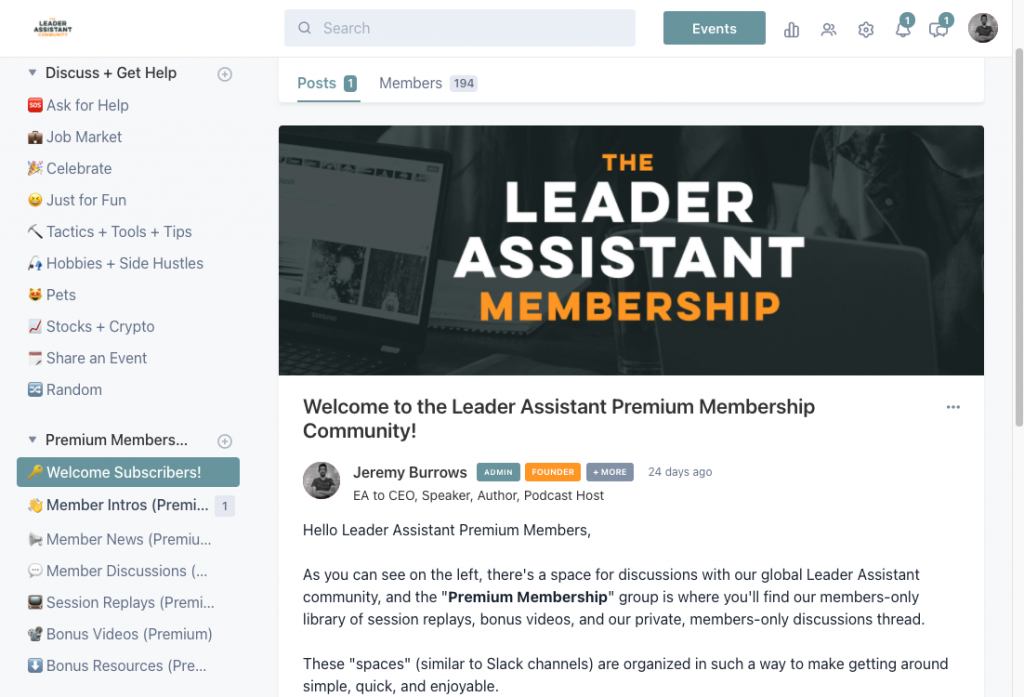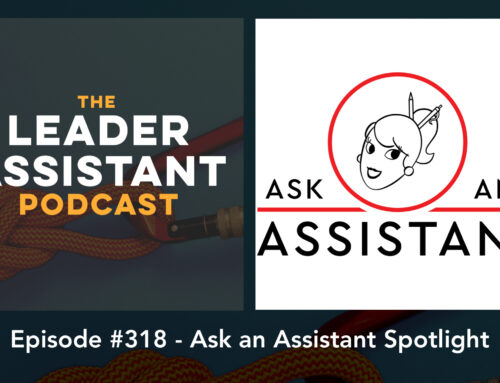Jamie Vanek made the unexpected career leap from teaching to construction in 2007 and discovered a passion for project management and team leadership.

In this episode of The Leader Assistant Podcast, Jamie shares her career journey and talks about dismantling the stigma around support roles, rethinking administrative structure in small businesses, and restoring respectability to the assistant role.
I hope you enjoy our conversation, and be sure to check out Jamie’s book, Buried in Business: Find Freedom by Unlocking the Power of Your Admin Team to learn more about clarifying admin functions and how doing so helps business owners and managers leverage the potential in their businesses.
LEADERSHIP QUOTE
The most meaningful way to succeed is to help others succeed.
– Adam Grant
CONNECT WITH JAMIE
- Jamie on LinkedIn
- Website – jamievanek.com
- Book – Buried in Business: Find Freedom by Unlocking the Power of Your Admin Team
- Instagram – @jlvanek
- Jamie on Facebook
ABOUT JAMIE
Jamie Vanek made the unexpected career leap from teaching to construction in 2007 and discovered a passion for project management and team leadership.
As a female leader in the construction industry, Jamie sees stereotypes and stigmas around supporting roles every day. She’s been featured in Construction Business Owner, Construction Executive, ThriveGlobal, and other digital publications about breaking glass ceilings and leading in a male-dominated industry. Jamie has taken a deep dive into small business experiences, stories, statistics, and strategies to formulate a framework for managing administrative functions.
Jamie is passionate about breaking down barriers and creating opportunities. It’s time to rethink administrative support. By clarifying the admin functions and redefining traditional roles, leaders can leverage the potential in their businesses to grow stronger. Find out more in her new book: Buried in Business: Find Freedom by Unlocking the Power of Your Admin Team.
THE LEADER ASSISTANT PODCAST IS PRESENTED BY GOODY
A special thanks to my sponsor, Goody!
If you send business gifts to employees, clients or sales prospects, Goody is a game changer. You can send one gift or hundreds at the same time, without ever worrying about shipping details. With Goody, your gift recipients provide all their shipping info, and they can even swap out your gift for another option if they prefer. It’s free to start gifting and you get a $20 credit when you sign up. Oh and if you mention you heard about Goody on The Leader Assistant Podcast, Goody will add an extra $10 credit to your account.
Go here to start gifting today!
THE LEADER ASSISTANT PREMIUM MEMBERSHIP
To learn more about how you can join growth-minded Leader Assistants, check out our Leader Assistant Premium Membership for ongoing training, coaching, and community.
THE LEADER ASSISTANT BOOK
Download the first 3 chapters of The Leader Assistant: Four Pillars of Game-Changing Assistant for FREE here or buy it on Amazon or Audible.
LEADER ASSISTANT LIVE EVENTS
Check out our constantly updated schedule of events for admins and assistants at LeaderAssistantLive.com. Including our all-day, online leadership workshop at leaderassistantlive.com/workshop.
JOIN THE FREE COMMUNITY
Join the Leader Assistant Global Community here, or the Facebook Group here for bonus content and to network with other assistants who are committed to becoming leaders!
SUBSCRIBE
Subscribe to The Leader Assistant Podcast so you don’t miss new episodes!
You can find the show on Apple Podcasts, Spotify, Google Podcasts, Pandora, and Stitcher.
Join my email list here if you want to get an email when a new episode goes live.
LEAVE A REVIEW
If you’re enjoying the podcast, please take 2 minutes to rate and review the show on Apple Podcasts here. Each review helps me stay motivated to keep the show going!
—
EPISODE TRANSCRIPT
Jamie Vanek 0:00
Hi, my name is Jamie Vanek and today’s leadership quote comes from Adam Grant. The most meaningful way to succeed is to help others succeed
Podcast Intro 0:15
The Leader Assistant Podcast exists to encourage and challenge assistants to become confident game changing leader assistants
Jeremy Burrows 0:29
The Leader Assistant Podcast is brought to you by goody. If you’re starting to think about holiday gifts for your team like I am, goody is a game changer. They have amazing gifts that people will really love, including brands that give back to charitable causes. As a longtime executive assistant, I’ve always been nervous about holiday gifting season. But thankfully, goody’s platform lets you send one gift or hundreds at the same time without ever worrying about shipping details. Can I get an amen? With goody your gift recipients provide all their shipping info, and they can even swap out your gift for another option if they prefer. It’s free to start gifting and you can get a $20 credit when you sign up. Oh, and if you mentioned you heard about goody from The Leader Assistant Podcast, goody will add an extra $10 credit to your account. Go to leaderassistant.com/goody to start gifting today. Hey, friends, thanks for tuning in to The Leader Assistant Podcast. It’s episode 187. You can check out the show notes at leaderassistant.com/187. Today I’m very excited to have a special guest on the show. And her name is Jamie Vanek. And Jamie is an owner of ADM innovate and President at a construction company which we’ll learn hear more about here in a second. But Jamie first Welcome to the show and what what part of the world are you in? What city are you in?
Jamie Vanek 2:03
Oh, thank you so much, Jeremy, I am I in Virginia in southeastern Virginia, over on the east coast.
Jeremy Burrows 2:13
Nice, very well, maybe not very, but a little known fact about me. So I’m from Kansas City, Missouri, grew up in Kansas City, Missouri. But I was actually born in Virginia. So Virginia is has a special place in my heart. However, I moved away when I was one, so I don’t really remember it.
Jamie Vanek 2:33
I’m sure it’s ingrained in there somewhere.
Jeremy Burrows 2:35
Right, exactly. Awesome. Well tell us a little bit about your career. Maybe you’ve got some construction experience, which is kind of interesting. And then, you know, being a female leader in the construction industry, which is also interesting. So tell us kind of rewind and tell us about where you kicked off your career and how it led you to where you are today.
Jamie Vanek 3:05
Yeah, so it’s an interesting story. And this is probably the question I get most often is how did you go from being an art teacher to construction. So if I go back to college, I went to I went to college and Philadelphia grew up outside Philadelphia, went for fine arts, graduated went on to get my master’s degree in education. And I taught art in an elementary school for about four years. And when my husband was relocated to Virginia, I took that as an opportunity to reset my career because here’s the thing. We need excellent teachers, we need passionate teachers, we need wonderful teachers in our public schools. However, teaching art was not really in. Well, it wasn’t a passion of mine. So I took the opportunity to reset I said, okay, if I’m not going to be passionate, I’m not doing justice to the students and to the school. So let me let me rethink how I want to do my career. I went to a temporary placement agency and gave him my resume, say, Hey, here’s my qualifications, my degrees, where can you put me and they put me in an admin position initially in a very large corporation doing accounts payable, I was on one floor where the entire floor was accounting. It was all kind of accounts, accounts payable, accounts receivable, and I was stuck in a cubicle. And that’s where I had my first experience working with a project manager. And so my job as accounts payable in this temporary position was to just go through all these pages and pages and pages of parts and dollars and just match them up with the invoices. That’s all I had to do. It was very tedious. It was very repetitive. But I had to call the project manager to get approval and I never met the project manager, they were on another floor in the building, I was not allowed to go to the floor, I just had to call them and get their approval. And many times they were not even there and their assistant had to speak for them and give their approval on their behalf. And I thought to myself, Well, I would love to be a project manager, because it sounds like a really cool thing to do. But I don’t have the qualifications. So maybe I can be the project managers assistant. And that’s where the idea started. And I will tell you, I lasted a whole of two weeks in that position, because I caught very frustrated, I got frustrated with the process. And I it was not for me, and they called me one day, the temporary placement agency called me and said, You know what, they decided this is not working out.
Jeremy Burrows 5:47
What was? What was the not for you part? Was it the assistant part? Or was it the project manager part? Or was it just the executive are the team that you’re working with?
Jamie Vanek 5:56
It was the lack of that lack of autonomy. I was neither the project manager nor the project managers assistant, I was just the accounts payable person that could only call them and ask their approval. And I got very curious in that role. I started asking a lot of questions. I started questioning some of their processes. I said, Well, why don’t we do it this way? Do we have a directory and and they just didn’t like all that question.
Jeremy Burrows 6:24
It’s good to do your do the job and keep your mouth shut. Right? That’s right,
Jamie Vanek 6:28
keep your head down, do your job and don’t ask any questions that and that just did not work for me. So it was a blessing in disguise, because it gave me that view of project management and project management assistant, but also, you know, show me what it was, but also show me that was not necessarily the company for me. So after that the placement agency then placed me in a construction company. And it was a very small electrical company that was very welcoming. It was literally walking into a home, they had taken a normal residential home, converted it into some offices. And so it was very warm and welcoming. And I had a very different experience there. Where the owner was involved in the day to day, she was very welcoming. She was very open. The other project managers and the other folks in the office were very warm and welcoming and opening even though I had no construction experience whatsoever. At that point. When they saw my aptitude for learning, they decided to hire me on full time. And they did put me in a project manager assistant role at that point. So at the ripe age of 27, I found myself as a project manager assistant and a construction company. And that is really where my career and construction. Just Springboard it is that a word springboarded. It is now. It just sprung into action where I really got a chance to dive into the construction process. I learned a lot about all of the technical aspects of construction, I was paired up with some really great mentors and construction that taught me along the way. And I spent about four years in that company, I learned as much as I could absorb as much as I could, went on to a couple other construction companies until I landed in the company where I am today. And I have now been here for 10 years started out as a contract administrator went up through project management, and then into the executive team.
Jeremy Burrows 8:30
So tell us a little bit about what it is like being a woman in the construction industry. So my wife was a project engineer at a construction construction company and can’t say that word tonight. And she ended up being deciding to kind of go on the superintendent route. But she wanted to get her hands dirty literally. And so she devoted herself and became a carpenter’s apprentice for a year. And of course, she was like the only while she was there. She was one of two women carpenter construction workers on this job site. So anyway, I know a little bit about it just from from her stories and her experience. But tell us about being in the male dominated industry, just from your point of view.
Jamie Vanek 9:21
Oh my god, well first, tell your wife that that’s awesome. We need more. We need more people like that because women can be amazing in the field because they’re detail oriented and they pay attention. Oh my gosh, it’s wonderful. So it’s it’s great to have a more diverse workforce, you know, going into the future of construction, but my experience in construction was on the management side. Like I said, I went from administration into project management and here’s what I saw. And what I continue to see is in construction, we have this very very clear divide between operations and administration, where operations is very male dominated and administration is very female dominated. And when I went into construction, I went in with a very clear purpose to cross that divide from administration into operations, which is when I made the jump into project management, I absolutely loved it. I loved project management, I loved everything about it. I love metrics. I love measurables. I love schedules, I love budgets, I love all that great analytical stuff. And it is still evolving, we still have a long way to go. But I have seen a lot of progress in the past 15 years that I’ve been involved in construction, where there is a lot more diversity across departments, and across the entire construction industry, which is very, very exciting to see and exciting to be a part of, but we still have a long way to go. And where we need to really focus and help support and be advocates for women or any diverse group minority groups in construction is being advocates, being allies and welcoming them into departments where they aren’t usually seen, I had a very, very positive experience where I worked with a lot of male colleagues that were very welcoming. They taught me they mentored me, they wanted to see me succeed. And that was a great supportive environment to be in, I came across a few situations where I didn’t, I came across, you know, some some barriers, some people that were not comfortable with me being in the role that I was in, but where I found the most confidence is I had to learn the projects and know them inside and out. And I had to know them better than anybody else on the project. And if I did that, then I could earn their respect. It wasn’t about a personality. It wasn’t about, you know, stereotypes, it was just about showing them that I knew what I was doing, and that I belonged in that space. And once I got through that, and I earned the respect of my colleagues or in the respect of other folks that I was working with, and subcontractors and customers, then I was able to continue that that confidence and built a reputation in the industry, at least in this area. So that was that was my experience. It’s it’s a little bit different for women. But I think that it is a absolutely wonderful career to be in.
Jeremy Burrows 12:38
That’s great. So tell us a little bit more about what what you’re doing with your website and your book. And, you know, I’m gonna call it a side hustle. I don’t know if you’d call it a side hustle. But tell us a little bit more about what you’re doing outside of the construction world. Yeah,
Jamie Vanek 12:56
it is absolutely a side hustle. But there’s a lot of overlap with what I’m doing right now. Because I’m currently president of Elm Street Development Group, which is a small construction firm, a, you know, a sister company to TSD construction. And I’ve taken a lot of the lessons that I have learned along the way, in administration and in leadership to have three goals here, I want to dismantle this stigma of admin, I want to rethink the way that we manage administration and small businesses and restore the respectability because what I have seen working not just in this one company, but across many companies, is that with small businesses, and this is overly prevalent in construction, but I think it’s applicable to all small businesses. And small business, you have an owner, you have a manager, you have some sort of leader that has this passion for the business. And they tend to wait a little bit too long to engage their admin, whether that’s their first hire, or whether that’s the way that they structure their admin, and ends up getting really, really messy. And that messiness. It is, it is difficult for that owner or manager or leader because they end up getting buried and all of the day to day of the business. But it’s also frustrating for the admin that are hired, because their roles just aren’t clear enough. They don’t have a lot of clarity on what they’re supposed to be doing. They’re just kind of there to catch all the mess that comes down and try to make sense of it. And they don’t have a clear path for growth. They don’t understand what decisions they have the authority to make, because that owner leader manager has waited a little bit too long to hire this person. And so therefore, they’re in this mode of desperation, and they’re just dumping all the crap that they don’t want to do on to their admin. And we need to rethink the way that we’re doing that because in a large corporation, there are a lot more policies, there’s more structure, and we may not see this quite as often but in the small businesses, I see it happen over and over and over again. And the owners, managers, leaders end up spending so much time going back and trying to clean up the messes that they may have created with their admin without being structured enough when they first brought them on. So my goal with this with the side hustle with my side business, and my book is to give this tool to the small businesses before it becomes a desperate situation. If they have the structure, and they have the framework before it becomes desperate, then they can posture themselves for growth, they can think more strategically about where the business is going. They have a partner that is understands what their role is, what their purpose is, and what decisions they have the authority to make, and postures them for for growth and strength in the future.
Jeremy Burrows 15:52
Yeah, that’s great. So you know, oftentimes, I’ll talk with assistants at large organizations, and the role seems to get more defined and more specialized, even the bigger the organization, and the the larger they grow and more team members they have versus with the small teams, it’s like, oh, yeah, like you said, you’re just getting dumped all the crap that they have to do all just okay, whatever it is, just just figure it out. And so I’m interested, your book is called buried in business find freedom by unlocking the power of your admin team. And what So on one hand, I’m like, Okay, well, that is part of that was my job. Because I was hired number one, we had probably eight people on day one, I was the only non software developer for our software startup. And I did run HR, I did run accounting, I did run Office Manager, I did kind of do all the other crap, if you will, other than building the product and coding the software. But I also even told my CEO, I said, Hey, you know, I’m not a math person. I’m not a people person. I’m not going to I’m not an HR Finance person. But I’ll help you out until we can get to the point where we can hire an HR person and hire a math person. So there was, at least in my mind, there was a, there was a path, it wasn’t just random, I’m just doing whatever they’re thrown at me. It was like, Hey, I’m doing this because we need someone to do it right now. But with the goal of handing it off down the road. So talk through a little bit about like, what you mean by wreath rethinking the structure and a small business or what what you talk about in your book about? How can these executives and assistants and there’s assistants listening right now I guarantee that are in a small business, and they are tired of the mess, and they’re there? They’re the ones buried in business? So what are a couple of practical tips you have for for business owners, but specifically assistants? In that position?
Jamie Vanek 18:09
Yeah, so your example is great, because there are two things that I see going on there. Number one is you were aligned with the vision of the company, you understood your part, in the greater mission of the company, and sometimes small business leaders neglect to really instill that message all the way down to their admin. And that’s number one. Number two, is that there was an aspect of delegation, and I speak with groups a lot. I’ve done some workshops on this where delegation is viewed as okay, what is delegation? Well, if delegation is I tell somebody else what to do. That’s not what delegation is. Delegation is actually the act of empowering others to act on your behalf. So if you’ve been empowered to make decisions, then you’ve been properly delegated to, and then you have the authority to make decisions within the parameters of your role. And if you understand that, well, then you can excel and be a be a rock star admin, and really support your executive. However, there are a lot of executives that don’t take that don’t really think that hard about the way that they’re delegating. They think of delegating as just, I’m going to have this thing that needs to be done. I’m going to give it to them. I’m going to tell them what to do next. I’m going to tell them when it’s due. And that’s essentially the extent of my delegation. But when they step back and really think about what delegation is, they need to number one and power. And number two, give them the authority to make decisions within the parameters of their role. So if you had that experience of okay, I understand number one, the mission of the company, the vision, where it’s going to go and the growth possibilities and how I fit into that bigger picture. And number two, I understand what authority I have what decisions I can make within my role right now. So I think that that is a great way to get started in a small business, the wonderful opportunities about a small business is exactly what you said, admins have this great opportunity to experience a much broader range of skills within a small business, because they just need someone that can wear a whole lot of hats, like you did. And that’s an awesome opportunity for admins to get started. And it gives them exposure to a lot of different things. And then as the company grows, if you’re in a strong company with strong leadership and the right structure, the admin has that opportunity, then say, Okay, I have experience doing 12345 different things. But now that we’ve grown, I know that my passion and my strength lies in skills, number one, and three, you know, whatever that may be. And then you can almost define your own career path as the as the company grows, which is vastly different than what people experience in big corporations. And a big corporation, your path is kind of pre designed for you. It’s very linear, it’s how you enter through this department. And here is the path to growth. You know, you check this box, you get this credential, and then you get the next rung in the ladder. Whereas in a small business, the opportunities are like wide open. And it’s a great, great position to be in as an admin to explore all these different things. And then define your own career path. If you’re in a good company that’s postured for growth.
Jeremy Burrows 21:39
Wow, well said well said. So what do you do though, if your leadership, your, your executive management doesn’t really respect the admin role, and you know, one of your points was restoring respectability. So how can we as assistants, from our end, help to restore respectability to our role?
Jamie Vanek 22:02
Yeah, that’s, it’s a tough one to address from the admins perspective. But I think a lot of it comes into that rethinking the structure. Because if you are in the right framework and the right structure, then it comes almost naturally, it’s part of the role. And in the book, what I’ve done is I’ve laid out a framework. And this framework is perfect for executives who have admin that need a little bit more structure. And they need to understand how to define it and pass on that vision to their admin and figure out how they fit into to the greater mission of the company. But it’s also a great tool for admin to have to take a look at their current role, take inventory of what they’re doing within this framework, and start to apply some of the theories within the book. So the book lays out the framework in the metaphor of a house. And I love a great metaphor. So there’s metaphors and stories throughout the entire book, to help make the point but the metaphor is all about a house. And you have to envision your admin lives in their own house within the company. And within that house, there’s a bunch of different elements that I go through in the book, one of them is the windows, the windows represent the different workflows that they participate in. If you’re at an entry level, kind of startup company, where you may be the only admin you have multiple windows that go across multiple departments. But as the company grows, you kind of refine those windows and say, Okay, well, I may have initially had an HR window and an Accounting window, and a marketing window and an executive assistant window. But then as it grows, you realize you’ve kind of refined those and you may have gone towards the exec executive assistant, where now it’s, you know, scheduling, its event planning, maybe a little bit of marketing and, you know, networking, and then it’s also defining the address of the house. And the address has to do with the greater purpose of the role. So an example would be you have someone in an administrative position that has to do with accounting, they’re doing accounts payable, accounts receivable, maybe some payroll, maybe some taxes, a little bit of all of that. But the the purpose of the role isn’t to do data entry. The purpose of the role is to make sure everyone gets paid. And if we keep coming back to that greater purpose than when questions arise, whether it’s a process question, a personnel question, anything like that, we can say, Okay, if my greater purpose is to make sure everyone gets paid, when this question comes in, I can evaluate it against this purpose and decide, is this something that I am the best person to address? Or Should a good ello go elsewhere? Does it affect how someone gets paid, whether it’s a vendor or a customer, the company or employees, or is it something that needs to be brought to the attention of the executive or someone else so that That just gives a filter for the admin to really evaluate some of the things that come across their desk. Because we all know there’s a lot of random stuff that comes across an admins desk from time to time. And in those kinds of situations, you know, if it’s payroll day and someone’s calling you about, hey, can you fix my computer, you have the authority to say, Hey, listen, today is payroll day. And my job is to make sure that you get paid. So hang on to your computer for a minute, let me process payroll, and either here’s our resource to fix your computer or I will get back to you tomorrow. And then empowers the admin to do to have those conversations with some authority. I go through, you know, how the manager leader business owner can support mentorship and really support the structure of the house, we talk about some of the cracks in the foundation, because there are some cracks in the foundation of administration that come through that are systemic, that have to do with either gender, salary, creativity, things that aren’t normally associated very strongly with administrative roles, and how they can start to undermine the respectability and the strength of the admins house. So those are just a few teasers about how the the metaphor plays out throughout the book. But I really think that it gives a lot of people tools, whether it’s the executive giving them tools on how to manage and structure their administrative team, where it gives the admin professionals some tools on how to have these conversations with their executives and with their team about what their purpose is.
Jeremy Burrows 26:43
Love it. Well, thank you, Jamie, for sharing your story and sharing some of your tips and teasers in your book will definitely link to your website, your social media, and of course, your book buried in business find freedom by unlocking the power of your admin team. We’ll put all those links in the show notes at leaderassistant.com/187 Leaderassistant.com/187. For those of you listening, definitely go there and connect to Jamie on all the social media links and order her book buried in business. So Jamie, thank you so much for being on the show. Thank you for writing this book for business owners and executives who need to figure out how the heck to use their assistants and empower their assistants and partner with their assistants.
Jamie Vanek 27:39
Absolutely. Thank you so much, Jeremy for having me on here. It’s been a blast. I appreciate everything and looking forward to connecting with people in the future.
Jeremy Burrows 27:59
Please
Jamie Vanek 27:59
review on Apple podcasts.
Goburrows.com










